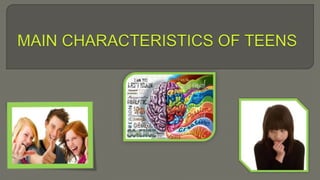
Main characteristics of teens
- 2. Piaget's identified five characteristic indicators of adolescent cognitive development and named them as follows: Formal operations. Hypothetic-deductive reasoning. Propositional thought. The imaginary audience. The personal fable.
- 3. 1° FORMAL OPERATIONS Piaget use "mental operations" to describe the mental ability to imagine a hypothetical situation and to be able to determine a likely outcome. An adolescent with the ability to think abstractly can describe events they have never seen or experienced. This is commonly called a "What if--?" scenario.
- 4. Is the ability to think abstractly in a more scientific and logical manner. This ability helps a person solve problems by working on one aspect of the problem (Oswalt, 2012). For example, a person comes into a dark room and tries the light switch, which doesn’t work. The person assumes that the light has burned out and goes and gets a light bulb. He inserts the new light bulb, but it still doesn’t work, so he checks to see if the light is plugged in. He finds that the light is indeed unplugged and plugs it in and voila!
- 5. Is the ability to make a logical conclusion based on the wording of a statement rather than the observation of it (Oswalt, 2012). A good example of this kind of thinking occurs in yoga audio podcasts vs. a yoga video podcast. In an audio podcast, the person doing the yoga practice must rely on the logic of the words to perform the practice, whereas someone who does not have this ability must rely on a video.
- 6. Is the ability to make judgments, interpret and observe. In adolescence This is acquired at a time when their bodies are changing (Oswalt, 2012).
- 7. Is also a characteristic in adolescence. This is where teens develop the ability to compare themselves to others and they begin to notice their personal strengths and weaknesses (Oswalt, 2012).
- 8. Thirteen-year-old teens are dealing with the physical changes in their body - puberty - emotionally as well as physically. This will cause your young teen to feel uncertain, moody and be sensitive to what others think of them, especially their peers.
- 9. Fourteen-year-old teens feel pretty happy with themselves as much of the angst from the changes they have been going through levels off and then have gotten used to no longer being a young child anymore.
- 10. Fifteen-year-old teens are pushing their parents to do more and more on their own, and they do not want to have to ask permission to do it a 15-year-old teen is that the latter doesn't want to have to seek your permission to do something independently.
- 11. Sixteen-year-old teens are comfortable in their own skin and know the ropes as to the life around them. They have learned much about themselves in the past few years and are able to see when they are at their best and when they are at their worst. They also see the best and worst of their parents which will gain you some criticisms and complements oftentimes right out of the blue.
- 12. Seventeen-year-old teens are more in-control of their moods and emotions. They form stronger relationships than in the past and are able to build strong bonds with friends They begin to see their future and can feel both excited and apprehensive about it. The 17-year-old teen has less conflict with parents, but will still push for more independence.
- 13. The eighteen-year-old teen is on an identity quest into their future. They want to figure out where they will fit in today's world. It is a time for big change that comes with a lot of freedom and happiness along with feelings of nostalgia and apprehension. The 18-year-old is often idealistic and enthusiastic about their future goals .
- 14. http://www.parentfurther.com/ages-stages/15-18/intellectual-development http://extension.udel.edu/factsheet/teen-cognitive-development/ http://www.sevencounties.org/poc/view_doc.php?type=doc&id =41157&cn=1310 http://amanda-jacobs.blogspot.mx/2012/01/piagets-theory-of-adolescent- cognition.html http://parentingteens.about.com/od/agesandstages/tp/Social- And-Emotional-Development-Teens-Ages-13-18.htm
